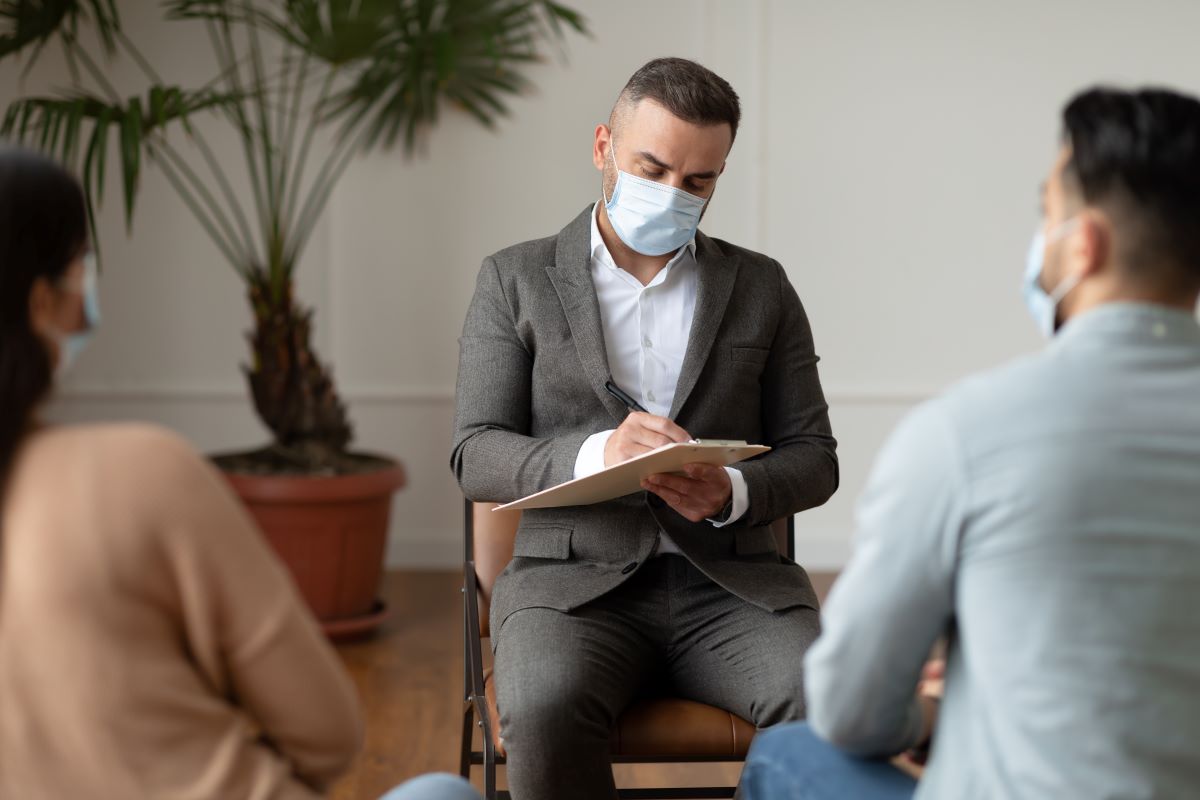When You Should Go To Couples Therapy
My husband and I have a generally healthy, happy marriage, but we still need help from time to time. Whether we have a big decision we need to make, have the same disagreement come up again and again, or are simply feeling a little stuck in a rut, we always benefit from getting someone else’s input and advice.
After we first got married though, I wasn’t sure when it was appropriate to ask for help, so I did some research to find out what couples therapy could help with and when we could start going.
So how soon is too soon to go to couple’s therapy? It’s never too early to go to couple’s therapy. Being proactive about creating a healthy relationship by talking to a therapist can save you a lot of heartache down the road, not to mention the time and effort it takes to undo your bad habits.
If you’re considering going to a couple’s therapist, or even if you aren’t, there are some common signals that can let you know it’s time to make an appointment.

When To Go To Couples Therapy
If you’re like most couples, you’ll probably start to experience some difficulties in your relationship after the first few months or years. It’s perfectly normal for new couples to have disagreements and even major arguments from time to time.
However, if you find that you and your partner are having the same arguments over and over again without ever reaching a resolution, or if you’re facing a life event that’s adding significant stress to your relationship, it might be helpful to visit a couples therapist.
Every relationship is different, so there is no one-size-fits-all answer on when it’s time for couples therapy, but there are some common signs that it might be time to seek professional help:
- You’re having the same arguments over and over with no resolution
- You and your partner can’t seem to communicate effectively
- You’re feeling disconnected or distant from your partner
- You’re dealing with a major life transition, such as the birth of a child, a move, or a job loss
- You’re experiencing grief or loss
- You have different values or beliefs that are causing conflict
- You’re considering divorce
- You’re struggling with infidelity
If any of these sounds at all familiar, don’t wait to get help. Couples therapy can help you and your partner work through these issues and prevent them from causing further damage to your relationship.
Couples therapy can be incredibly helpful, but it’s not a magic bullet. It takes time, effort, and commitment from both partners to make it work. But if you’re willing to put in the work, couples therapy can help you build a stronger, healthier relationship.
If you think couples therapy might be right for you, talk to your partner about your concerns and see if they’re open to the idea of seeking professional help. If so, make an appointment with a therapist who specializes in couples therapy to get started.
What Couples Therapy Can and Can’t Do
Couples therapy can help you and your partner work through a wide variety of issues, but it’s important to understand that it’s not a magic cure-all.
Meeting with a therapist won’t automatically fix all of your problems, but it can help you learn how to effectively communicate with each other, resolve conflicts, and build a stronger relationship.
If you’re considering couples therapy, it’s important to go into it with realistic expectations. Here are some things that couples therapy can do:
- Help you and your partner communicate more effectively
- Give you a better understanding of each others’ points of view
- Teach you how to resolve conflict in a healthy way
- Build trust and intimacy
- Help you deal with grief or loss
- Strengthen your relationship
- Learn about each other’s needs and how to meet them
However, there are also some things that couples therapy can’t do. Here are a few examples:
- Fix all of your problems overnight
- Make your partner change if they don’t want to
- Solve all of your communication issues
- Automatically take away your bad habits
If you’re considering couples therapy, it’s important to understand both what it can and can’t do. This will help you set realistic expectations and get the most out of your therapy sessions.

How Couples Therapy Works
When you meet with a couples therapist, they will likely start by meeting with you and your partner together to get an understanding of your relationship and the issues you’re facing.
They may also meet with each of you individually to get a better sense of each person’s perspective. After that, they’ll typically have both you and your partner together for your sessions.
Once they have a good idea of what you and your partner are working through, the therapist will help you and your partner communicate more effectively, identify and work through conflict, and build healthy relationship habits. They’ll do this by asking questions, giving feedback, and providing practical exercises and steps for you to take.
Therapy sessions typically last for 50 minutes to an hour, and most couples meet with their therapist once or twice a week for several months. As your therapist gets to know you and your partner, they’ll be able to give you a better idea of how often and how long they think you need to meet, and they may change this as you progress.
Couples therapy can be done in person, over the phone, or online. Many therapists offer online therapy, which can be a convenient option if you have a busy schedule or live in a rural area.
Choosing a Couples Therapist
If you’re considering couples therapy, it’s important to find a therapist who is a good fit for you and your partner. Here are a few things to keep in mind when choosing a therapist:
- Look for a therapist who specializes in couples therapy. Not all therapists are trained in couples therapy, so it’s important to find one who specializes in this area.
- Check to see if the therapist is licensed. To be a licensed therapist, they must have a master’s degree or higher in counseling or a related field and pass a state-recognized exam.
- Make sure the therapist has experience treating couples with issues similar to yours. For example, if you’re dealing with infidelity, look for a therapist who has experience treating couples who have experienced infidelity.
- Check to see if the therapist has any areas of specialty. Some therapists may specialize in treating couples who are dealing with infertility, for example, while others may specialize in treating LGBT couples.
- Ask about the therapist’s approach to treatment. There are different approaches to couples therapy, so it’s important to find one that aligns with your needs and values.
If you find a therapist you think both you and your partner like and then change your mind after your first meeting, don’t worry. Every therapist is different, and they understand that they may not be the best fit for everyone. Keep trying out therapists until you find the right one for you. Many therapists even offer shorter consultation appointments to allow you to get a feel for if you want to continue working with them or not before you fully dive in.
The most important thing is that both you and your partner feel comfortable with the therapist and believe they can help you, so don’t be afraid to keep trying until you find the best fit for you.
How to Find a Couples Therapist
If you’re not sure how to find a couples therapist, here are a few places to start:
- Your health insurance company. Many insurance companies have a list of covered providers on their websites, which can help you narrow down your options.
- The American Association for Marriage and Family Therapy. This website has a searchable directory of therapists who specialize in marriage and family therapy.
- The American Psychological Association. This website has a searchable directory of therapists who specialize in psychology.
- Your local church or community center. Many community centers, churches, and similar places of worship or community outreach have a network of therapists that they can refer you to.
- Your primary care physician. Your doctor likely knows of some licensed therapists and psychologists in your area.
- Your friends and family. Consider asking a trustworthy friend or family member if they’ve worked with a therapist before and what their recommendations are.
When you’re ready to take the next step in your relationship, couples therapy can be a valuable tool. It’s important to remember that there’s no one-size-fits-all approach to couples therapy.
What do I do if I want couples therapy but my partner doesn’t?
- If your partner doesn’t want to go to couples therapy, listen to them so you understand why not.
- After that, you can explain why going to couples therapy is really important to you.
- Ask if they’d be willing to try it once or to set aside time to talk just the two of you without a therapist. Just make sure the issue doesn’t turn you against each other or add another stressor to your relationship.
Will my insurance cover couples therapy?
- Many insurance companies will cover at least some of the cost of couples therapy.
- It does depend on your specific insurance plan.
- It’s a good idea to check with your insurer before you start therapy to find out what your coverage includes.

Conclusion
Couples therapy can be a helpful tool for couples who are dealing with relationship issues. If you’re thinking about starting therapy, remember that there’s no one-size-fits-all approach. Find a therapist who you and your partner feel comfortable with and who has experience treating the specific issues you’re dealing with. Do not be afraid to keep trying out different therapists until you find the right fit.

